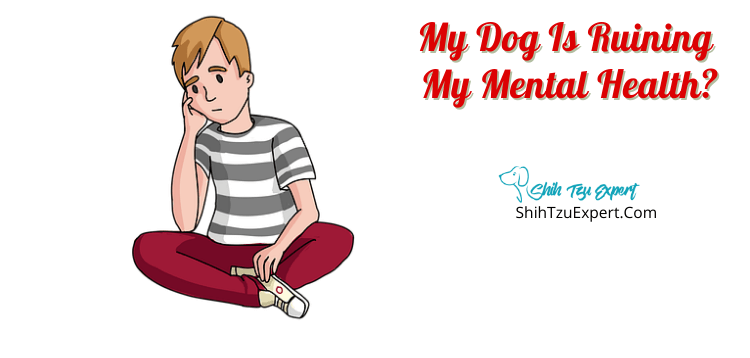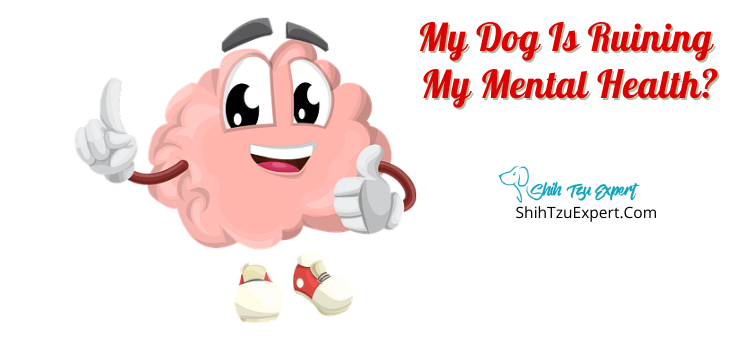Dogs: man’s best friend or man’s worst nightmare?
If your dog is always misbehaving and trying their best to ruin your house and your mind, you might eventually start developing hatred. We cover the common reasons people feel like their dogs are ruining their lives and mental health and what can be done about it.
My dog is ruining my mental health
Having a dog involves lots of patience and training, without this a dog will begin to learn undesired behaviors and start to negatively impact your life, even causing and worsening mental health issues. If training can’t help a bad dog, or mental health deteriorates, eventually it might need to be rehomed.

My Dog Is Ruining My Life
Dogs can’t always be the cute and cuddly companions we want them to be. Sometimes, they can really get on your nerves, act up and wreak destruction on unsuspecting victims incessantly. Or they’re just too much for you to handle and it’s harming your mental health (and the levels of affection you’re feeling for them).
If your dog is ruining your life, something is seriously wrong. Dog ownership isn’t a walk in the park, but it shouldn’t be making your life a living hell.
Hopefully, we can clear up some common issues and attempt to resolve them so that you can get back to enjoying some quality time with your pet.
My Puppy/Old Dog Is Making Me Miserable
Your particularly old dog might be making you miserable. They smell bad and it can be sad to see your pet start to lose their spark in front of you, stop going for walks and start moping around more often.
Getting old can take its toll on a dog and it’s not always a pretty process, but it’s important to try and continue to care for them even if it takes more work than before. Think of all the happy times you’ve had together and work out how to give them comfort in the time they’ve got left.
If your puppy is making you miserable, it’s understandable. In human children, they’re known as the “terrible twos”. You’ve brought home a toddler who’s still to learn potty training and just discovering the joys of digging, sinking their teeth into something destructible and misbehaving.
Try not to react when your puppy does something wrong, even if it’s something that angers or upsets you. Puppies learn best through positive rewards and not punishment. If you react negatively, your pup might begin to associate this behaviour with negative energy and it might start appearing when you least want it to.
My Dog Makes Me Feel Trapped
If you feel like you are living for your dog and it’s restricting you from getting out of the house and going on with the rest of your life, something has got to change. Your dog is reliant on you, but not 24/7 and a bit of independence is good for them.
Your dog might cry horribly when you try to leave the house, but you’ve got to ignore their ear-piercing screams and walk out of the door, otherwise, you’re only rewarding them. Once they realize you’ve left, or they get bored (depending on how smart they are) they’ll find something better to do.
My Aggressive Dog Is Ruining My Life
Having an aggressive dog can be a real challenge. The most important thing is to try and maintain your calm, as displaying signs of fear or aggression can make the situation worse.
Training is very important. You need to teach your dog which behaviours are acceptable and which aren’t. You also need to teach your dog who’s in charge.
If you feel comfortable, you can start the training at home using online resources. The basic formula is to reward good behaviour with treats or playtime. You should avoid punishing your dog by shouting or getting angry at them, they won’t understand why and it could encourage their aggressive behaviour.
You might want to take training classes with a professional if you’re scared of training your aggressive dog. They’ll help you to assert your dominance and give you advice for managing your dog’s behaviour, such as harnesses for making walking an easier experience.
Can Pets Make Anxiety Worse?
Dogs are a huge responsibility. It’s natural to find yourself worrying about them and asking yourself whether or not you’re giving them the right care. Just like with new parents, a lot of these anxieties decrease or go away over time.
If you find yourself up at night or worrying constantly that you’ve made a mistake, that you can’t meet your dog’s needs or that you might end up in a bad situation because of your dog, it’s not healthy for either of you and can make your anxiety worse.
Dogs are emotional animals, they’ll notice a change in your attitude towards them and maybe even reciprocate it.
If your dog is making your anxiety worse, you should speak to your vet and your therapist. They’ll both be able to help you with information and solutions to the problems you’re facing.
Can A Dog Make You Depressed or Anxious?

You might feel that you’ve lost your free time and social life since getting a pet. You can’t be gone for hours and hours because they need someone to feed them or take them out outside so they don’t mess in the house. This can be managed with better time management.
By enriching your life, you’ll incidentally enrich your pup’s life too.
If you’re feeling depressed that you’re a bad owner, you should make sure that your beliefs are founded in fact before letting them negatively affect your state of mind. Yes, your dog might misbehave occasionally and doesn’t respond when he’s asked to come, but you’re training him, right? Don’t judge yourself and your pup by your results, but by your progress.
Are Pets Bad For Mental Health?
Dogs are not going to cause you mental health issues. However, if they’re causing you a lot of added stress, they might be contributing to making your condition worse.
If you’ve got a particularly difficult dog, it’s easy to lose hope and blame yourself. It’s not your fault! Dogs have all got to go through a training period to learn how to behave appropriately and it might take you months longer than you expect.
Plenty of studies have shown the benefits of therapy support animals in treating people with mental illnesses.
The results seem almost unanimously successful, suggesting that dogs are more helpful to your mental health than harmful. However, therapy dogs receive extensive training in how to behave and need to meet very high standards before going out to work with their patients, so can’t be compared with a dog that’s a living nightmare.
How Do Dogs Affect Your Mental Health?
Being the sole person in charge of every aspect of another living being’s life is no small task. For some people, this can be an incredibly empowering and purposeful experience for those with well-behaved pups, for others, it can be much more destructive.
It’s worth noting that it’s harder to bring a rescue pup into the family than a puppy. Rescue puppies have already learnt some potentially wrong behaviours and bring a bunch of emotional baggage with them, which is often reflected through the way they act.
The right dog can greatly improve your mental health, by providing you with endless love and hugs when you need them and proof that if you can keep another living creature alive, you’re doing pretty well. The wrong dog will make you want to tear your hair out and shut yourself away from the world, only causing you more distress.
Can Animals Improve Mental Health?
Therapy dogs are becoming a far more common option for people suffering from mental health issues. Sometimes, a handler will bring a trained dog for regular sessions with their patient. Other times, people suffering from a mental health problem might choose to adopt a therapy pup completely.
Animals can improve mental health by encouraging people to exercise, which releases endorphins and other “happy hormones”. They help provide structure in a day and a way to meet new people. Animals also provide unconditional love and a non-judgemental source to vent to, plus big sloppy kisses to cheer you up.
Can Dogs Sense and Help With Depression And Anxiety?
Studies show that dogs do sense our emotions, through smelling the hormones that we release. It’s also been shown that when a dog knows their owner is in distress, they will try to help.
Of course, dog owners have known this for years – it’s common to find your dog offering you a bit of comfort and a friendly paw when you’re feeling upset.
Can Dogs Help With Anxiety Attacks?
Trained therapy dogs are taught to recognize and respond to panic attacks by shielding their owner from other people, fetching water, medications or help and providing support and a comforting paw or lick on the cheek. Many pet dogs will behave similarly, studies have shown that dogs have a real sense of care for their owners and will try to intervene if they see that you’re in distress.
Can You Get A Service Dog For Anxiety And Depression?
The most well-known service dog is the guide dog, but other service dogs are trained for diabetes, anxiety, depression and PTSD.
You’ll have to meet some pretty strict criteria if you want a service dog and they’re not cheap because of all the hours of training involved.
A cheaper and easier option would be adopting an Emotional Support Animal (ESA). They’re considered pets in the eyes of the law and don’t go through the same training, but can provide emotional support to people with mental health issues and still have the capacity to be taught the same commands if you want to put in the effort.
What Is The Best Dog For Anxiety And Depression?
The best dog for your depression and anxiety depends on you as much as the dog. Service dogs are selected based on their temperaments and ability to pass training and could be any breed of dog.
Dogs like Labrador retrievers, golden, German shepherds, huskies, boxers and poodles are often chosen as good candidates due to their brains and loving personalities.
What Are The Puppy Blues?
A bit like postpartum depression, the puppy blues strike after you’ve recently welcomed your new puppy (or rescue) to the family and begin to feel a sickening dread that this was a bad decision. Common symptoms include feeling overwhelmed, sad, anxious or trapped.
How Long Do The Puppy Blues Last?
The post-puppy blues start within the first few days or weeks of getting the new puppy and can last anywhere from a week to a few months.
Most people seem to get over them by the time their dog is 6 months old, possibly because it’s at this point that they stop teething!
Some people will find that the puppy blues reoccur when their pup enters a new developmental stage, littered with new obstacles and curveballs to dodge along the long road to training your dog. It usually returns less forcefully and for a shorter amount of time.
What Causes The Puppy Blues?
Sleepless nights
Since the arrival of your new “bundle of joy”, 8 hours of sleep a night has been kicked out in favour of midnight potty training. Disruption or lack of sleep is a significant contributing factor that could be leading to you feeling depressed or anxious.
Changes to your routine
You have to start thinking for two, you and your pup, when it comes to time management and fitting in important activities like food, walks, potty training and puppy training. Extra responsibilities and less free time can contribute to feelings of being overwhelmed or anxious.
Distractions and disruptions
Adopting a puppy means saying goodbye to your free time, for the moment. With the demanding needs of their small bladders and bowels, their short attention spans and the teething pains, puppies require almost 24-hour attention. With less time to focus on yourself, your mental health can miss out.
Loss of freedom
Adopting a puppy might result in you missing out on socials with your friends to prioritize your pup’s walk or dinner time. Being restricted from your friends and not being able to enjoy the leisure activities you could before can contribute to the puppy blues.
Lack of information
If it’s your first or third time raising a puppy, it’s important to learn the basic facts about your dog and their development so that you can create a realistic set of goals for their training. You might feel as if the expectations you had of having a puppy aren’t being met as all dogs learn differently, at their own pace.
Mental illness
Changes to your daily routine, having less time available for you and being responsible for another living creature are all factors that can make your life more stressful and exacerbate preexisting mental health conditions.
What’s The Difference Between Puppy Blues And Depression Or Anxiety?
When you compare and contrast the symptoms of puppy blues with those of depression or anxiety, they are pretty much the same. The difference is, the puppy blues are caused specifically by your dog’s behaviour, like accidents inside, tearing up your clothing and not listening to commands. The puppy blues also appear to be short term, lasting from a few weeks to a few months.
When Should I Talk To A Therapist About The Puppy Blues?
You should absolutely speak to a therapist if your puppy blues are causing you suicidal thoughts, anxiety about something other than your puppy or are inhibiting your ability to get on with life. The sooner you can speak to a therapist, the better, they’re not just there as a last resort.
Therapists can provide a safe space to talk and analyze your emotions, sort out solutions and come up with a plan. They’ll also help you to find ways to enjoy your time with your pup or assess if having a puppy is the right thing for you at the moment.
How to Handle the Puppy Blues
- Don’t be afraid to ask for help
Maybe unsurprisingly, most friends and family members would jump at the chance to puppy sit for a while. Asking others for help can give you the chance to relax for a couple of hours. After a little bit of time off, the idea of raising your pup might not seem so overwhelming.
- Make friends with other puppy owners
Other puppy owners can provide a critical network of information, advice and support. You’ll get a reference for your puppy’s progression and can compare and contrast training methods to find something that works for you and your pup.
- Speak to your vet
Your vet is going to be your guardian angel when it comes to raising your pup and will gladly share their advice for keeping you and your companion at your healthiest and happiest. Don’t be afraid to give them a call, lots of common issues or questions can be answered over the phone.
Research the cause
Knowing what to expect as your puppy develops through each new phase of their lives will provide you with the tools and the confidence you need to face them. It’ll also help you to set realistic goals, in line with your pup’s age and capacities.
Puppy training classes
As well as being a great way to socialise for you and your dog, training classes also offer you the chance to ask your questions to a professional and pick up some tried and tested advice.
Record and celebrate how far you’ve come
Realistic goals and patience are key! You can’t expect a puppy to master training at the age of 3 months, it’ll take months of accidents and continued teaching until they’re fully house trained.
Take it easy on yourself and your pup
It’s important to get some rest from time to time! Take half an hour to yourself or get someone to dogsit and take the whole day to yourself.
Take the time for some headspace. You’ll feel much calmer and more relaxed when you return to training and your pup will note it!
Remember it’s only temporary
Your pup is going through a phase and will eventually start to learn the lessons you’re trying to teach them!
I Hate Our Family Dog, How Can I Convince My Family To Rehome It?
Rehoming a pet is not a decision to be taken lightly. You want to ensure that your pet is going to a responsible home that will be able to provide for them adequately.
If you really hate your dog and really want your family or spouse to get rid of it then you should start by voicing your opinion. However, given that 95% of owners consider their pups to be part of the family, there’s a chance they might not take the news very well. Most people have made a commitment to their dogs for the rest of their lives, so be sure to think it through from their point of view.
References
- https://www.akc.org/expert-advice/training/puppy-training-timeline-teaching-good-behavior-before-its-too-late/
- https://wagwalking.com/sense/can-dogs-smell-depression
- https://xomypets.com/my-dog-is-making-me-miserable/
![10 Best Dog Crates for Separation Anxiety [High anxiety dog crates 2019 Reviews] 10 Best Dog Crates for Separation Anxiety [High anxiety dog crates 2019 Reviews]](https://shihtzuexpert.com/wp-content/uploads/2019/05/5-3.jpg)
![12 Best Dog Foods for Toy Breeds [Buyer's Guide] 12 Best Dog Foods for Toy Breeds [Buyer's Guide]](https://shihtzuexpert.com/wp-content/uploads/2019/05/3-5.jpg)


